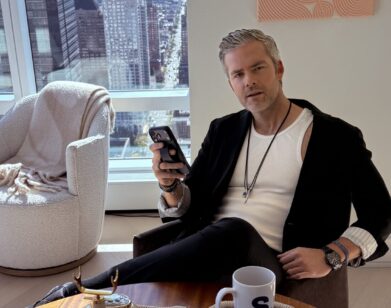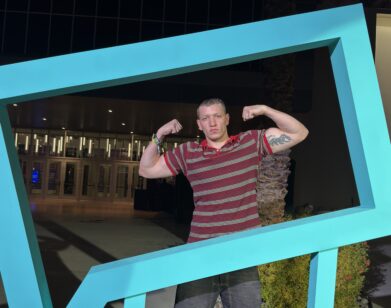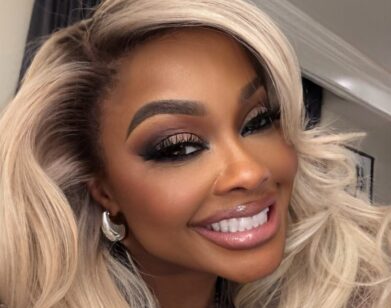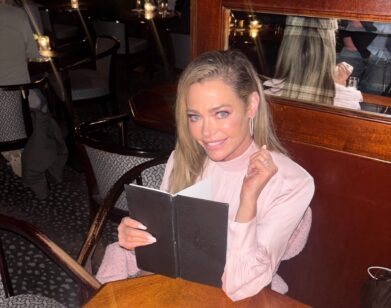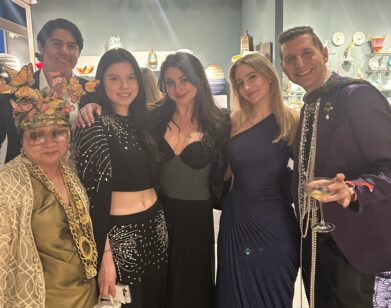watch what happens
Andy Cohen on Why Real Housewives is a Sociology Lesson
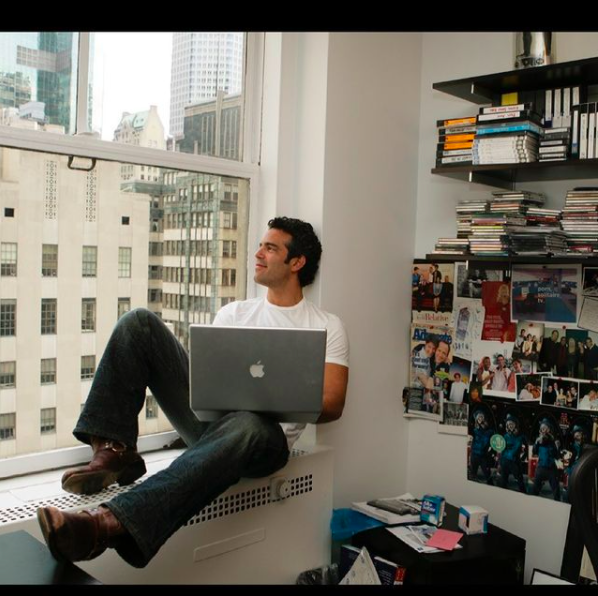
Andy Cohen in 2006, a week after the premiere of Real Housewives of Orange County. Via Instagram.
The face of Bravo has seen it all during his time at the network, where he now serves as host and Executive Producer of Watch What Happens Live and Executive Producer of the Real Housewives franchise. From table-flipping and Scary Island to progressive conversations about Mormonism and race, Cohen is largely responsible for the evolution of the network’s programming and, in turn, reality television at large.
During that time, Cohen himself has evolved. He’s now a father to his 2-year-old son Ben, who he welcomed via surrogacy in April 2019, and his professional repertoire has expanded to include late-night host and best-selling author. Come March 25th, he will host For Real: The Story of Reality TV, a seven-part E! series that looks at the origins of reality television and how it continues to impact our lives, both socially and politically. For Cohen, it’s just another day at the office.
———
DANIEL TRAINOR: Hello, Mr. Andy Cohen!
ANDY COHEN: Hi, guys!
SAM STONE: We’re excited to talk about reality television with you. To kick things off, what does America love about reality TV, and how do you think it has managed to remain a sensation?
COHEN: I think they love that it’s real, you know? It’s unpredictable. As crazy as it seems, I think there’s also some level of relatability in it. If it wasn’t relatable, they wouldn’t still be watching. I think people appreciate the humor, too.
TRAINOR: When did reality TV first hit your radar? I remember the first season of Survivor being such a cultural moment for me, and for so many others. When did you first realize that reality television might be the new frontier?
COHEN: For me, it was the first season of The Real World. That’s why I cried when I reunited the cast for this new show. I was so moved by it because those people were a big touchpoint for me in my life. That was really big for me. As you said, Survivor was the first big format show where I was like, “Holy shit, this format is brilliant and it could really go on forever.”
STONE: What was it, specifically, about The Real World that spoke to you?
COHEN: It was so simple, yet totally unscripted and surprising. Putting those people together was the ultimate sociological experiment. You did not know where it was going to go.
TRAINOR: In many ways, reality TV has been on the same trajectory as social media, and I don’t think those two things are unrelated. Do you think reality TV is responsible for the way people present themselves online, or is it social media which dictates what is shown on television?
COHEN: I think [reality television] definitely paved the way for the mentality that real people could become famous. With social media and YouTube and everything else, people were like, ‘Wait, I can do this myself.’ You didn’t need to wait to get cast on an MTV show. Everything just exploded.
STONE: Social media and reality TV have become analogs for each other, and we’re sucked into a cult of personality around stars. Do you think that keys into the modern American political scene and the rise of Trump-era politics?
COHEN: I think it has opened the door for people speaking horribly to each other. It’s incredible that we had a president who was calling women “fat” and terrible names, and it was just accepted. I have to assume both social media and reality television played a part in that. I would also throw cable news in there, too. Cable news is just a bunch of nasty name-calling.
TRAINOR: It plays into this idea that, in some ways, reality TV is built off the backs of people we love to hate. But walking that line between ‘love to hate’ and outright hate can be difficult. When it comes to the shows that you are responsible for, how do you determine if you’re just giving airtime to people who are hateful?
COHEN: There are two types of people: ‘love to hate’ and ‘hate to hate.’ You try and get away from the ‘hate to hate’ people, because that’s not fun. If someone is only hateful, then it’s not going to work. Conversely, and I think this is why the Housewives are still going, there are people that you think you hate, and then suddenly you find yourself relating to them and cheering them on when something happens to them in their lives. You know, look at Camille Grammer on the first season of Real Housewives of Beverly Hills. She said things that annoyed people and pissed them off, but then her husband dumped her and people felt terrible for her. It’s a ride. It’s reflective of life. Sometimes you meet someone and you think they’re horrible, but then you have a moment with them that’s a turning point, and you’re like, “You know what? I actually like that person.”
STONE: The reality TV landscape has certainly become more complex over time. How do you think reality TV has managed to change and evolve?
COHEN: In some ways it’s changed, and in some ways it really hasn’t. There are so many kinds of reality shows. American Idol is a reality show, a reality-competition show. Survivor is a reality show, an actual physical strength competition. The Housewives are reality shows, but they’re more of a docu-series that’s also a sociology lesson. It’s all over the map.
TRAINOR: When you were first filming Vicki Gunvalson yelling about family vans and puttering around her home office some 15 years ago, I can’t imagine you envisioned the Housewives franchise becoming what it has, where you’re having nuanced conversations about religion in Salt Lake City or important reflections on race in Atlanta. How involved in that evolution have you been?
COHEN: It’s been a slow evolution. I think I’ve always raised my eyebrow and said, “Oh, this is interesting, this is a new wrinkle.” During the Real Housewives of New York season in the middle of the 2016 election, some of the women were campaigning for Hillary [Clinton]. There was an election night party.
TRAINOR: Devastating.
COHEN: But then some of the other women didn’t want to talk about who they voted for. It was really real. I think each time that stuff sneaks in, you take a step back and think, “Oh, this is interesting.”
STONE: Where do you draw the line between Andy Cohen, the fan of reality TV, and Andy Cohen, the reality TV executive? Do those things play into each other?
COHEN: If I wasn’t a fan, I don’t think I would still be on this train so many years into it. I don’t like, I love watching the Housewives. I think it’s a great show. I think they’re all great. If I didn’t, I think I would be running some kind of scam. I’d be trusting an outfit I didn’t believe in. I believe in it and I love it.
TRAINOR: When you get home, are you watching reality TV? Or does watching reality TV feel like work?
COHEN: I watch documentaries. I don’t really watch other reality shows. I loved making this show for E! because we got to talk about so many other reality shows and really dig into them. That was fascinating. But no, I don’t really watch any other reality shows. I watched all of the NXIVM documentary, I just watched The Lady and the Dale. I’m excited to watch the Tina Turner documentary. I love docs.
STONE: Do you remember the worst pitch you’ve ever been given for a reality show?
COHEN: That’s a good question. Do you remember Madame the puppet?
TRAINOR: Yes!
COHEN: Wayland and Madame. My assistant said, “There’s a huge star that wants to pitch you something, but it’s secret and they don’t even want to tell security who’s coming into the building.” I was like, “Oh my god, J. Lo is coming!” It turned out to be Madame. I can’t remember exactly what the pitch was. I’ve been pitched a lot of horrible shows. Everyone thinks they should be on a reality show and everyone thinks that their idea is original, but a lot has already been done.
TRAINOR: As a Housewives fan, I would be remiss if I didn’t ask you about the rumored Housewives All-Stars season. What, if anything, can you tell me? I will literally sacrifice my body for any small detail.
COHEN: [Laughs] You’re going to do a body sacrifice?
TRAINOR: Andy, this is serious business!
COHEN: I know it is! The answer is: I can tell you nothing. Read into that as you may!
TRAINOR: To pivot wildly, it has been so lovely to watch you as a father. You seem to have embraced it with such zest. I can’t even imagine how challenging it’s been, though, to have a child during a global pandemic. What has the past year been like for you two?
COHEN: Well, thank you. It’s actually been great. I’ve been able to spend so much time with him, just endless amounts of time. He really saved my life this last year. If he hadn’t had been around, I don’t know what I would have done. I guess I would have smoked a lot of pot.

